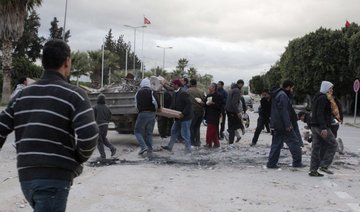Seoul: South Korea and the UAE are strengthening military ties through new agreements signed by their air force leadership on Wednesday, including cooperation in the development of the newest Korean supersonic fighter jet.
Maj. Gen. Rashed Mohammed A. Al-Shamsi, commander of the UAE Air Force and Air Defense, arrived in Seoul on a four-day official visit on Monday.
On Tuesday, he signed an agreement with South Korean Air Force Chief of Staff Gen. Lee Young-soo to establish regular bilateral meetings between their air forces, and on Wednesday, a letter of intent focused on cooperation related to the KF-21 Boramae fighter jet.
The KF-21 is a 4.5-generation supersonic aircraft developed by Korea Aerospace Industries and slated for official deployment in 2026. An Emirati pilot participated in its test flight during Al-Shamsi’s visit, as the cooperation will also include training UAE personnel to operate the jet.
“The South Korea Air Force regularly participates in the Desert Flag and IAMDOC (Integrated Air Missile Defense Operations Course) exercises held in the UAE. Moving forward, we aim to further expand our cooperation and defense exchanges with the UAE,” Lee said in a statement after the meetings.
He also reaffirmed Seoul’s commitment to supporting the operations of the Cheongung II, a South Korean medium-range surface-to-air missile system purchased by the UAE in 2022.
“We will provide training programs for Emirati air defense personnel to ensure the successful operation of the missile system,” he said.
The initiative to hold regular meetings with the UAE Air Force — Korea’s first air force-to-air force regular talks with a Middle Eastern country — stems from Gen. Lee’s visit to Abu Dhabi in March, during which both sides agreed on the need for closer military coordination.
Under the new framework, the two countries will hold bilateral meetings every six months.
Military cooperation between the UAE and South Korea started in 2006, when they signed a defense agreement. In 2011, at the request of Abu Dhabi, South Korea deployed its Akh Unit to a military base in Al-Ain to provide support in training the UAE special forces — an arrangement that continues to this day.
“It was the UAE that asked for Korea’s deployment. It seems the UAE sees South Korea as a reliable partner in Asia when they seek to diversify their defense,” Kim Kang-seok, professor of Middle Eastern and African studies at the Hankuk University of Foreign Studies, told Arab News.
“The UAE is focused on advancing its military’s AI capabilities and achieving defense self-reliance … The UAE has adopted AI initiatives as a key national strategy. That is also foraying into the military. This makes South Korea a very attractive partner because South Korea has a large AI capability, a growing military industry and a global economic standing.”
Advancing military ties is also in line with the comprehensive economic partnership pact the two countries signed last year. It is also a part of the UAE’s efforts to reduce reliance on the US for defense, as well as Seoul’s geopolitical considerations, according to Ahn So-yeon from the West Asia Center at Seoul National University.
“They are considering South Korea to be a very good partner in Asia. Since South Korea is an ally of the US, the UAE feels less pressured by the US when cooperating with South Korea, compared to other Asian countries,” Ahn said.
“The UAE is a key oil producer in the Middle East. The UAE is a key energy supplier for South Korea and is strategically located near the Strait of Hormuz. Stationing troops there helps South Korea safeguard ships on key maritime trade routes.”


























